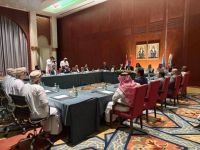US intel chief: Iraq and Syria may not survive as states
Public remarks by the head of the US Defense Intelligence Agency and by John Brennan, director of the CIA, suggest that Washington is making its peace with a break-up of Syria and Iraq. They hastened to say that break-up was not US policy, they simply saw it as likely. (Despite what conspiracy theorists allege, and despite the failed Biden initiative, US policy has consistently favored keeping Iraq together; it is easier to sign one oil deal than three after all). Last month similar sentiments were voiced by outgoing US commander in Iraq, Gen. Ray Odierno.
Continue reading on Informed Comment
Faces of Belgrade's refugee parks
In his poem On Fifth Avenue He Greeted Me (dedicated to Rashid Hussein), Mahmoud Darwish wrote: Are we to remain like this/Moving to the outside/In this orange day/Only to touch/The dark and vague inside?
Darwish writes about the state of exile, about being a refugee. Like I wrote recently – refugees are not a new thing. Palestinians have been refugees for so long now that being a refugee is a normal thing, it’s an identity, it’s one’s whole life. People are fleeing Afghanistan and Iraq for decades now. People are leaving Syria and Libya for years now. And that is just to name a few.
Continue reading on Middle East Revised
Homosexuality and the Arabic novel
It wasn’t just the novel itself, but Zaghmout’s expert steering of it. On her blog, Nadia Muhanna writes about an interview with Zaghmout on Jordanian TV several months after the book’s release. His interviewer referred to a gay character in the novel as shaz, an offensive term. Zaghmout corrected the presenter, using the term muthley. “By the end of the interview,” Muhanna writes, “the presenter was using ‘LGBT-friendly language.’”
Zaghmout’s fast-paced novel, translated into English by Ruth Ahmedzai-Kemp (2015), is as much a social project as a literary one, a moderate push toward sexual and gender liberation. One feels, while reading it, that it was less important to Zaghmout to craft the great Jordanian novel than it was to show that women’s and queers’ lives matter. Fair enough.
Continue reading on Your Middle East







